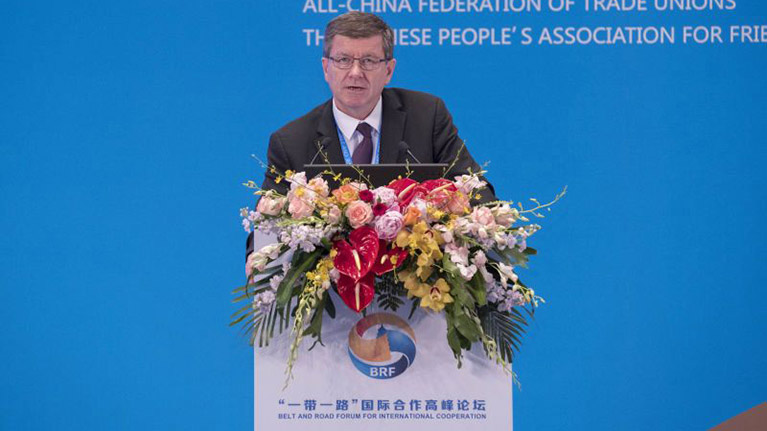Belt and Road Forum for International Cooperation
Guy Ryder addresses the Belt and Road Forum for International Cooperation
A transcript of the Director-General’s speech delivered at the Belt and Road Forum for International Cooperation: Thematic Session on People-to-People Connectivity, Beijing.

The International Labour Organization highly appreciates this opportunity to contribute to this important forum. We have heard this morning that the Belt and Road Initiative is all about connectivity and each of the dimensions of connectivity, of course, is important. But perhaps none more so than people-to-people connectivity and I think there are two reasons for this: firstly, it is because, in the end, the success of the initiative will be judged and will be measured by the impact on people, how it increases their opportunities, how it improves their living standards, how it enhances their human security. But it is important also, because people today are increasingly drawing back from each other, anxiety about the future and erosion of trust in the intentions of others is generating a growing rejection of globalization and of openness.
President Xi Jinping this morning likened openness to a chrysalis, bursting out of its cocoon. But it seems today that many people want to go back into their cocoons and that, I think, could be detrimental for us all.
President Xi spoke in Geneva at the beginning of this year and said that the failures of globalization should not be a reason for abandoning it, but rather a reason to improve it and correct its failures. I believe, that is precisely what the Belt and Road Initiative can do. And this morning the president stressed that the initiative must contribute to the eradication of social injustice, to the reduction of income inequality, and that it must embody high ethical standards.
Ladies and gentlemen, in this regard, the very strong synergies between the Belt and Road Initiative and the UN 2030 Development Agenda are evident, and an important way that China can give leadership in the multilateral system. And at the heart of the 2030 Agenda is a commitment to create decent work for all. The Belt and Road Initiative has tremendous potential to impact people’s lives above all, by generating decent work opportunities for them.
But this will require enormous efforts to ensure that the potential is truly realized in full. Infrastructure must be built, investment channeled, trade promoted by policies which deliberately optimize the benefits for all.
What does this mean? It means ensuring respect for the rights and interests of people at work, so that they can obtain their fair share of the benefits of the initiative. It means extending to them social protection, particularly needed in times of change, because even the best built of roads has some rough patches.
It means it could be working people with new skills and training. It means providing them with the skills needed in the new 21st Century economy. It means working with investors, be they national or international, to ensure that their activities contribute to the greater goals of the Belt and Road Initiative.
Ladies and gentlemen, these are all major challenges, but they are challenges inherent in accompanying the enormous opportunities of the Belt and Road Initiative. The International Labour Organization looks forward to reinforcing its excellent relations with the Government, Workers and Employers Organizations of China and indeed with their counterparts in all of the countries of the Belt and Road Initiative to realize the decent work potentials and possibilities of the initiative.
We look forward to doing just that.
I thank you for your attention.